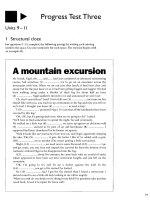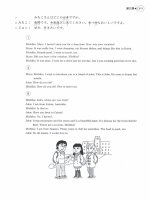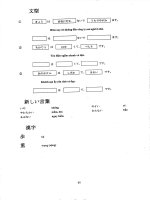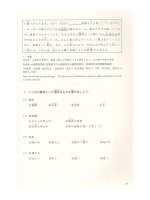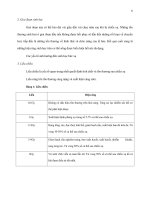betty azar grammar plus phần 8 pot
Bạn đang xem bản rút gọn của tài liệu. Xem và tải ngay bản đầy đủ của tài liệu tại đây (495.43 KB, 39 trang )
241
Worksheet 74A: EXAMPLES
© 1997 Prentice Hall Regents. Duplication for classroom use is permitted.
Fun with Grammar
With your partner, decide which of the meanings at the bottom of the page best
matches the meaning in each sentence.
1. I remembered to pa
y my bills this past weekend.
2. I often forget to put
money in the parking meter.
3. I remember w
atering my garden when I lived in England.
It took three hours because the garden was so big.
4. How can you forget visiting
Thailand?
5. I’ll never forget buying
my first car.
6. I regret to tell you
that Arthur Ashe has died. I know
how much you admired him.
7. She regrets to tell us that she can’t come to our party.
8. I regret starting
to smoke when I was 13 years old.
9. We regret moving
to New York City.
10. I ha
ve tried to learn Spanish, but I’m not a good student.
11. He tries to exercise
every day.
12. Andrea tried sleeping on the floor, but her backache
continued.
13. If you burn yourself, try putting ice on the burn
immediately.
a. duty or responsibility
b. to recall or not recall the past
c. wishing you had not done something in the past
d. telling bad news
e. experiment with new approaches or solutions
f. make an effort
242
Worksheet 74B: EXAMPLES
© 1997 Prentice Hall Regents. Duplication for classroom use is permitted.
Fun with Grammar
1. What must you remember to do before you leave home?
2. What have you forgotten to bring to class?
3. What do you remember doing on your last vacation?
4. What can you never forget eating?
5. What do you regret not doing in the past?
6. What news would you have for your parents that might start out
“I regret to tell . . .”?
7. If you have a sunburn, what could you try doing?
8. What have you tried to do but were not successful at?
243
Worksheet 75: WHICH IS IT?
© 1997 Prentice Hall Regents. Duplication for classroom use is permitted.
Fun with Grammar
Choose the best answer to each of your teacher’s five questions. Then discuss
your choices with your group. Your teacher will repeat a question if there is
disagreement within your group.
1. a. John stopped to buy premium gas last week.
b. John stopped buying premium gas last week.
2. a. Mary remembered to lock the door before she left.
b. Mary remembered putting the cat out before she left.
3. a. I regret telling you the secret about Jennifer.
b. I regret to tell you that I wrecked your car.
4. a. Thu was very hot, so she tried to turn on the air conditioner.
b. Thu was very hot, so she tried turning on the air conditioner.
5. a. Kim did not forget to tell you about the test.
b. Kim did not forget receiving your letter.
244
Worksheet 76: COCTAIL PARTY
© 1997 Prentice Hall Regents. Duplication for classroom use is permitted.
Fun with Grammar
Situation #1
Plan a birthday party, complete
with entertainment and food, for a
classmate.
Verb suggestions: advise, stop,
consider, recommend, enjoy, ask,
plan, prepare, remember, want,
(don’t) forget, promise
Situation #2
A classmate wants to be accepted at
a prestigious university, but he/she
is nervous about the oral interview.
Give advice.
Verb suggestions: advise, avoid,
finish, (don’t) delay, mention,
practice, remember, dislike, (don’t)
quit, decide, need, want, wait
Situation #3
Complain about the rising cost of
living such as health care, car
insurance, etc. Try to end the
conversation on a positive note.
Verb suggestions: admit, deny,
anticipate, dislike, can’t help,
regret, tolerate, claim, afford,
hesitate, pretend, understand,
learn, want, appreciate, wish
Situation #4
Give advice on (a) losing weight
and (b) gaining confidence to make
a good impression on people (boss,
spouse, girlfriend/boyfriend, etc.).
Verb suggestions: advise, avoid,
keep, (don’t) miss, postpone,
suggest, expect, hope, seem, need,
struggle, learn, offer, want, plan
✄
245
Worksheet 77:
GO
+ GERUND
© 1997 Prentice Hall Regents. Duplication for classroom use is permitted.
Fun with Grammar
Go boating Go bowling Go camping
Go dancing Go fishing Go hiking
Go jogging Go running Go sailing
Go window shopping Go shopping Go sightseeing
Go skating Go water-skiing Go skiing
Go skydiving Go swimming Go birdwatching
Go canoeing Go hunting Go mountain climbing
✄
246
Worksheet 78: LINE-UPS
© 1997 Prentice Hall Regents. Duplication for classroom use is permitted.
Fun with Grammar
What is something you can’t
stand ?
What would you be happy
for me?
What are you afraid of my
?
What are you interested in
while you’re
in the U.S.?
What are you too embarrassed
?
What are you worried about
your family’s ?
What have you asked a friend
?
What did you promise your
parents not
when you left home?
A person can lose weight by
what?
What is something your parents
told you not ?
What are you thinking about
this
weekend?
What have you seen children
?
✄
247
Worksheet 78: (CONTINUED)
© 1997 Prentice Hall Regents. Duplication for classroom use is permitted.
Fun with Grammar
What did you hear a family
member/roommate
_______________ last night?
What have you noticed me
__________________?
What would you keep
_________________ even if your
parents asked you to stop?
What do you recommend
______________ tonight?
What would you like to quit
_______________?
What do you suggest
__________________ after class?
What have you been angry
enough ______________?
What do you prefer
__________________ in the
evenings?
What do you think I should
begin _______________?
What do you often postpone
_________________?
What have you agreed
_____________ for a friend?
What do you enjoy
_______________ on vacations?
What are you considering
______________ when you return
home?
What are you too young
________________?
✄
248
Worksheet 79: BOARD GAME
© 1997 Prentice Hall Regents. Duplication for classroom use is permitted.
Fun with Grammar
START
I was sad see
you leave.
Are you going
shop today?
I resent your
answer for me.
She opened
the jar by
twist the lid.
ROLL AGAIN
I'm used study
English.
I let her
ride my bike.
I forgot tell
you about
the test.
GO BACK
2 SPACES
I warned you
study harder.
I quit smoke
a year ago.
He got me
go with him.
GO BACK
3 SPACES
GO AHEAD
3 SPACES
She made
me feel
sorry for her.
Have you
decided buy
a new car?
ROLL AGAIN
It is easy fool
by his lies.
LOSE A TURN
She came here
get a good
education.
She is still
young enough
spank.
I heard it
rain last
night.
ROLL AGAIN
What do
you know
about ski?
We're thinking
about go swim
next week.
She pretends
listen to you.
She helped
me choose
a new school.
We look
forward see you
next quarter.
I am lucky
have you as
a friend.
She
encouraged
us get married.
This box is
too heavy for
me lift.
GO AHEAD
2 SPACES
He got an A
by work hard.
LOSE A TURN
He refused
help us with
our problem.
I'm trying
learn Chinese.
I dared
him jump.
She avoids
do laundry.
I was sorry
hear the news.
His not know
the answer
was unusual.
Do you mind
not smoke
in here?
FINISH!!!
GO BACK
2 SPACES
249
Worksheet 80: STORYTIME
© 1997 Prentice Hall Regents. Duplication for classroom use is permitted.
Fun with Grammar
Answer the questions based on the summaries below. Use either a gerund, an
infinitive, or a simple form in your answer.
1. One Life to Live
Maggie, who teaches children at a school for the deaf, meets Max when
she comes to Llanview to visit her cousin, Andrew. Max, a friend of
Andrew’s, is a widower with one-year-old twins. After Maggie spends
some time with the twins, she suspects that one of them, Frankie, is
partially deaf. She tells Max that he must take Frankie for testing. Max
refuses to believe that his son is deaf and tells Maggie to stay out of his
family’s business. Maggie, who grew up with a deaf brother, pursues the
matter, even setting up an appointment for Frankie without Max’s
knowledge. When Max finds out about the appointment, he is furious at
Maggie.
a. Why did Maggie come to Llanview?
b. Why is Max angry at Maggie?
c. What is Maggie determined to do?
2. General Hospital
Jason is in a car accident when the car he is riding in (his brother, A.J.,
is driving) hits a tree. Jason was not wearing a seat belt and was thrown
from the car. He experiences memory loss as a result of the accident. He
can’t remember anyone and gets particularly angry at his family and his
girlfriend when they tell him what he was like and how he used to act
before the accident. Jason is from a wealthy family and had been a
premed student. Because he knows he can’t match his family’s
expectations, he leaves home, rents a room, and takes a blue-collar job.
a. What is Jason angry about?
b. What did Jason decide to do?
c. What can’t Jason remember?
d. What did Jason stop doing?
13.1 COMPARATIVES
• Comparison Cards 1
• Comparison Cards 2
• Match
• Magazine Search
• It’s Bigger Than a Baseball
13.2 SUPERLATIVES
• The Superlative Taste Test
• Survey
• Classmate Questionnaire
• The Compliment Game
13.3 REVIEW
• Reading Questions
• Word Search
• Compare Them
• Who’s the Worst (Best)?
Comparatives and
Superlatives
13
251
13.1 COMPARATIVES
1. COMPARISON CARDS 1
Materials: Worksheet 81 or 3” x 5” cards
Dynamic: Groups
Time: 10 minutes
Procedure: 1. Make as many copies of the worksheet as you have groups. Cut the
worksheets up into cards to make sets for each group. Arrange the
class into groups of three or four and give each group a set of
cards.
2. One student in each group draws a card and makes a comparative
sentence using the two nouns and adjective on the card.
Example: My legs (short)
Your legs
Student sentence: My legs are shorter than your legs.
The other students in the group judge whether the sentence used
the correct comparative form and decides if it is logical/correct.
3. The students take turns in the group choosing cards and making
sentences until they finish all the cards or time is up. The students
can keep score in their groups to see who makes the most correct
sentences.
SUGGESTION: Make some of your own cards, using names of
students in the class.
2. COMPARISON CARDS 2
Materials: Small pictures
Dynamic: Pairs
Time: 15 minutes
Procedure: 1. Arrange students in pairs, and give each pair two or more pictures
to compare. (You may want to stick to one topic, such as famous
people, or have several types of pictures.)
2. Each pair writes comparisons of the two pictures.
Example: A bear is shorter than a giraffe.
3. When everyone has finished, have the pairs show their pictures
and read their sentences. You might ask the other students
whether they agree or disagree. This is interesting when students
use a subjective adjective (such as beautiful) as their point of
comparison.
NOTE: If you use famous people, you can write the names of the
people under the picture for the students, or have them say simply
“the man in picture A,” etc.
3. MATCH
Materials: Worksheet 82
Dynamic: Pairs
Time: 15 minutes
Procedure: 1. Put students into pairs, and give each pair a copy of the
worksheet. Go over the words on the list and explain any with
which the students are unfamiliar.
2. Call out an adjective or phrase from the list below. The students
choose two of the words or expressions on the worksheet and write
a comparison sentence. Continue until all the words on the paper
have been matched.
Adjectives to use with the worksheet:
clean expensive noisy slow
cold good pet quick spicy
dangerous hard short tall
easy to use large
Example: Instructor says: “spicy”
Students write:
“Mexican food is spicier than Italian food.”
3. Go over the sentences by having the pairs write them on the board
or read them aloud. The other students decide if the sentences are
logical and grammatical.
252
253
4. MAGAZINE SEARCH
Materials: Magazines or catalogs
Dynamic: Small groups
Time: 15 minutes
Procedure: 1. Put students into groups of three. Give each group several
magazines or catalogs that can be cut up. (Or, for a previous
homework assignment, ask the students to bring in magazines or
catalogs.)
2. In their magazines, the groups look for pictures to compare, then
write comparison sentences. The number of sentences you assign
will depend on how long you want to devote to this activity.
3. The groups take turns showing their pictures and reading their
sentences aloud.
5. IT’S BIGGER THAN A BASEBALL
Materials: None
Dynamic: Pairs
Time: 25 minutes
Procedure: 1. Use the following riddle as a model, or make up one of your own,
using comparisons.
It is bigger than a baseball.
It is as round as the moon.
It is as orange as a carrot.
It is as hard as a melon.
It is not as sweet as fruit.
Answer: A pumpkin.
2. The students work in pairs and use the structure above to make
their own riddles. Circulate and answer questions. Make sure the
students’ riddles are not too ambiguous; that is, the answer should
be clear by the time students get to the end of the riddle.
3. When they finish, do one of the following:
a. Tape the riddles to the wall. The students circulate and write
answers before discussing them as a class.
b. The students exchange papers and discuss the answers with
their partners.
c. The students read their riddles aloud for the rest of the class to
guess.
13.2 SUPERLATIVES
1. THE SUPERLATIVE TASTE TEST
Materials: Worksheet 83, three kinds of mints
Dynamic: Pairs/Small groups
Time: 20 minutes
Procedure: 1. Place three dishes of mints on a table, enough for each student to
have one of each flavor. Put students in groups of two or three.
Give each group a copy of the worksheet. One student from each
group will be the recorder. You may need to go over the worksheet
vocabulary words before the students begin the taste test.
2. Each student eats one mint from each dish, noting qualities such
as color, taste, and texture. Group members discuss these qualities
with each other and decide which mint ranks best in each area.
Then the group writes two sentences about each mint, using the
superlative.
Examples: Mint #1 is the smoothest tasting.
Mint #2 has the blandest taste.
Then the group decides which mint they liked the best overall.
3. Circulate to make sure that everyone is on task and is using the
correct forms of the superlatives.
4. Call on each group to share results with the class.
NOTE: Other types of food can be used. You can use three of the
same kind of food (such as three different brands of potato chips) or
have three very different food items, such as pickles, pretzels, and
hard candy.
2. SURVEY
Materials: Worksheet 84 (two pages)
Dynamic: Pairs/Small groups
Time: 30 minutes
Procedure: 1. Divide the class into pairs or groups of three or four. Give each
group 11 copies of a different section of the worksheet.
2. Have the students go over the words on their list and decide if
they would use most or -est to form the superlative. Do NOT allow
254
255
them to use dictionaries. Even if they are unfamiliar with some of
the words, they should be able to apply rules they know for
forming the superlative.
3. Send them out to ask 10 native speakers about which form they
think is correct, either in class time or as a homework activity. If it
is done during class hours, set a time limit. If it is not possible to
interview native speakers, the students should interview people
who are fluent or use English in their jobs.
4. The students tabulate their results and compare them to their
group’s answers. Each group then makes a short presentation to
the class and says what they think the best choice is and why. An
effective way to do this is to put the worksheet with the words for
each group on an overhead projector. The class will be able to
follow the oral reports more easily.
3. CLASSMATE QUESTIONNAIRE
Materials: Worksheet 85
Dynamic: Pairs
Time: 25 minutes
Procedure: 1. Put students into pairs. Give each pair a copy of the handout.
2. Have students answer the questions in complete sentences. Some
students will be able to answer without talking to their classmates,
but others will require asking their classmates questions.
Variation: To take less time, have students answer the questions in pairs without
talking to their classmates. They can begin the sentences with “We
think . . .” or “We guess . . .” Then have the pairs read their answers. (Have
all pairs give their answers for question 1 before going on to the next
question.) Determine who has written the correct answer. You may want
to do this as a competition and assign points for every correct answer.
4. THE COMPLIMENT GAME
Materials: 3”x 5” cards with an adjective written on
one side, paper
Dynamic: Whole class
Time: 20 minutes
Procedure: 1. Review the rules for superlatives, if necessary. Give each student a
card and a piece of paper. Tell the students to write, on the reverse
of their cards, the superlative form of the adjective on the front.
Suggested adjectives (for a lower-level class, you will of course
choose easier adjectives):
attractive delightful modern terrific
beautiful funny nice unique
bright happy pleasant wonderful
comfortable interesting pretty
cute large small
2. The students are to imagine that they are rich aristocrats at a party.
They are to act very formally and give compliments to everyone they
meet. They are to go up to other “guests” and show them the word
on their card. Each “guest” approached (Student B) then
compliments the “guest” who approached him or her (Student A),
using the correct superlative form of the word he or she is shown.
Example:
Student A’s card: beautiful
Student B’s compliment: You are wearing the most
beautiful dress in the room.
If Student B’s compliment uses the correct form of the superlative,
Student A signs Student B’s paper. If Student B’s compliment does
not use the superlative correctly, Student A does not sign Student
B’s paper. At the end of the alloted time, the student with the most
signatures (that is, the student who used the superlative correctly
the most) wins.
13.3 REVIEW
1. READING QUESTIONS
Materials: Reading handout or book used in reading class
Dynamic: Pairs/Small groups
Time: 30 minutes
Procedure: 1. Arrange students in pairs or groups of three.
2. Have each group make up 10 questions based on a short story or
novel they are using in their reading class. The questions can elicit
either the comparative or superlative form. If the students are in
different reading classes or if you do not have access to their
reading material, give them something short to read for
homework. Keep it short and relatively simple, as the focus of this
activity is to use the comparative and superlative, not to
concentrate on reading comprehension. Then discuss the reading
before the students make up their questions.
256
257
3. Have the groups exchange question papers with each other and
answer the questions they receive.
4. The groups then return the questions papers (now with answers)
to the groups who made them up to be checked.
SUGGESTION: You may want to set a time limit for making the
questions.
2. WORD SEARCH
Materials: Worksheet 86A or 86B
Dynamic: Pairs/Small groups
Time: 10 minutes
Procedure: 1. Put students into pairs or groups of three. Give each group one
copy of the worksheet.
2. Students work together to find all the comparative and superlative
forms. The forms may be up, down, forward, backward, or diagonal.
You may prefer not to include the word list on the worksheet.
3. You may set a time limit, or tell the students that the first group
to find all the forms wins.
SUGGESTION: A good way to go over where the hidden forms are is
to use an overhead after the game.
3. COMPARE THEM
Materials: None
Dynamic: Pairs
Time: 15 minutes
Procedure: 1. Put students into pairs. Assign each pair a different topic of
comparison.
Examples: Two fast-food restaurants
Two famous people
Two cars
Two animals
Two grocery stores
Two brands of soda
2. On the board, make a list of adjectives. Students choose from the
list to write 10 comparisons of their two items, using either
comparative or superlative forms.
You may want to choose from the following list of adjectives:
bad funny new quiet tasty
beautiful good nice rich ugly
bright handsome noisy serious wise
busy messy old short wonderful
empty neat pretty tall young
SUGGESTION: In a higher-level class, the pairs can write a
paragraph instead of individual sentences.
4. WHO’S THE WORST (BEST)?
Materials: Worksheet 87
Dynamic: Small groups
Time: 30 minutes
Procedure: 1. Divide the class into groups of three or four and give each student
a copy of the worksheet (or make one of your own).
2. After they read the story, the students in each group rate the
characters in the story from 1 to 4 as to who has the worst
character (#4 is the worst). There may be disagreement in the
group, so the students should express their reasons for their
choices (“Maria is the worst because . . .”).
3. After the group reaches an agreement, a member of each group
comes to the board and list the four characters in descending
order, #4—worst to #1—best.
4. Have the class compare the answers and discuss the differences.
Each group should be prepared to state why they listed the
characters in the order in which they did.
258
my legs
(short)
your legs
the weather here
(bad)
grammar
(difficult)
spelling
a giraffe’s neck
(fat)
an elephant’s neck
a tree
(thin)
a stick
a mouse
(small)
an elephant
winter
(good)
summer
a motorcycle
(expensive)
a bicycle
biology
(interesting)
history
comics
(funny)
novels
a skyscraper
(tall)
a gas station
my old shoes
(comfortable)
my new shoes
our grammar book
(easy)
our writing book
your hair
(long)
my hair
my eyes
(dark)
my teacher’s eyes
a chocolate bar
(fattening)
an apple
the weather in
my hometown
259
Worksheet 81: COMPARISON CARDS
© 1997 Prentice Hall Regents. Duplication for classroom use is permitted.
Fun with Grammar
✄
260
Worksheet 82: MATCH
© 1997 Prentice Hall Regents. Duplication for classroom use is permitted.
Fun with Grammar
Your teacher will give you an adjective. Choose two words in this list and
write a sentence using the two words and the adjective.
airplane cat dog ladder rock
ant chalk fog lake snow
bee charge cards giraffe Mexican food stilts
bus checks Italian food mud puddle wolf
1.
2.
3.
4.
5.
6.
7.
8.
9.
10.
261
Worksheet 83: THE SUPERLATIVE TASTE TEST
© 1997 Prentice Hall Regents. Duplication for classroom use is permitted.
Fun with Grammar
You have been selected by the Magnificent Marketing Company to taste-test
three new mints before they go on the market. The company wants to know
which mint the public prefers, and why.
Taste each mint. Describe its qualities, such as color, taste, and texture. Write
at least two sentences about each mint in the space provided, using
superlatives. Decide with your group which mint is best.
You may want to use some of these words in your sentences. You may use a
dictionary to find their meaning and/or a thesaurus to find other words to use.
delicious tasty smooth creamy sweet rich flat bland
MINT #1
1.
2.
MINT #2
1.
2.
MINT #3
1.
2.
We think the best mint is # .
262
Worksheet 84: SURVEY
© 1997 Prentice Hall Regents. Duplication for classroom use is permitted.
Fun with Grammar
Using the list your teacher assigns your group, decide together if you would
use most or -est to form the superlatives of the words. Then use the other
10 copies to survey native speakers about which form they think is correct.
GROUP 1: GROUP 2:
most -est most -est
1. old 1. wise
2. famous 2. clever
3. busy 3. pretty
4. important 4. beautiful
5. sweet 5. wet
6. gross 6. keen
7. handsome 7. difficult
8. rough 8. queasy
9. listless 9. tired
10. young 10. tough
GROUP 3: GROUP 4:
most -est most -est
1. slow 1. thin
2. gentle 2. active
3. friendly 3. happy
4. serious 4. courageous
5. late 5. wild
6. windy 6. yummy
7. confusing 7. orderly
8. funky 8. fast
9. helpful 9. comfortable
10. plain 10. narrow
✄
263
Worksheet 84: (CONTINUED)
© 1997 Prentice Hall Regents. Duplication for classroom use is permitted.
Fun with Grammar
Using the list your teacher assigns your group, decide together if you would
use most or -est to form the superlatives of the words. Then use the other
10 copies to survey native speakers about which form they think is correct.
GROUP 5: GROUP 6:
most -est most -est
1. red 1. new
2. common 2. pleasant
3. heavy 3. dry
4. expensive 4. dangerous
5. weak 5. soft
6. shy 6. uncanny
7. humid 7. unpopulated
8. safe 8. fat
9. delicious 9. boring
10. shallow 10. appetizing
GROUP 7: GROUP 8:
most -est most -est
1. small 1. sour
2. silly 2. noisy
3. valuable 3. embarrassing
4. nervous 4. homesick
5. loud 5. sad
6. merry 6. hungry
7. polluted 7. discouraged
8. dark 8. quiet
9. relaxed 9. popular
10. joyous 10. ghoulish
✄
264
Worksheet 85: CLASSMATE QUESTIONNAIRE
© 1997 Prentice Hall Regents. Duplication for classroom use is permitted.
Fun with Grammar
Answer the questions about your classmates in complete sentences.
1. Who is wearing the most jewelry today?
2. Who has the curliest hair?
3. Who has the longest name?
4. Who has the largest shoe?
5. Who has the nicest car?
6. Who has the most brothers and sisters?
7. Who brings the most books to class?
8. Who is the best singer in the class?
9. Who has studied English the longest?
10. Who traveled the farthest to come to this country?
265
Worksheet 86A: WORD SEARCH (LOWER LEVEL)
© 1997 Prentice Hall Regents. Duplication for classroom use is permitted.
Fun with Grammar
Find the comparative and superlative forms of the words on the list. The
forms may be listed up, down, forward, backward, or diagonally.
FEEMWBFRFR
ASSROTUEEL
RRLBRSRHWM
TOEERETTEB
HWASSRHRRE
EASTASEUOS
SSTFBESFMT
TEWORSTRAF
Word list:
AS
BEST
BETTER
FARTHER
FARTHEST
FURTHER
FURTHEST
LEAST
LESS
MORE
MOST
WORSE
WORST

